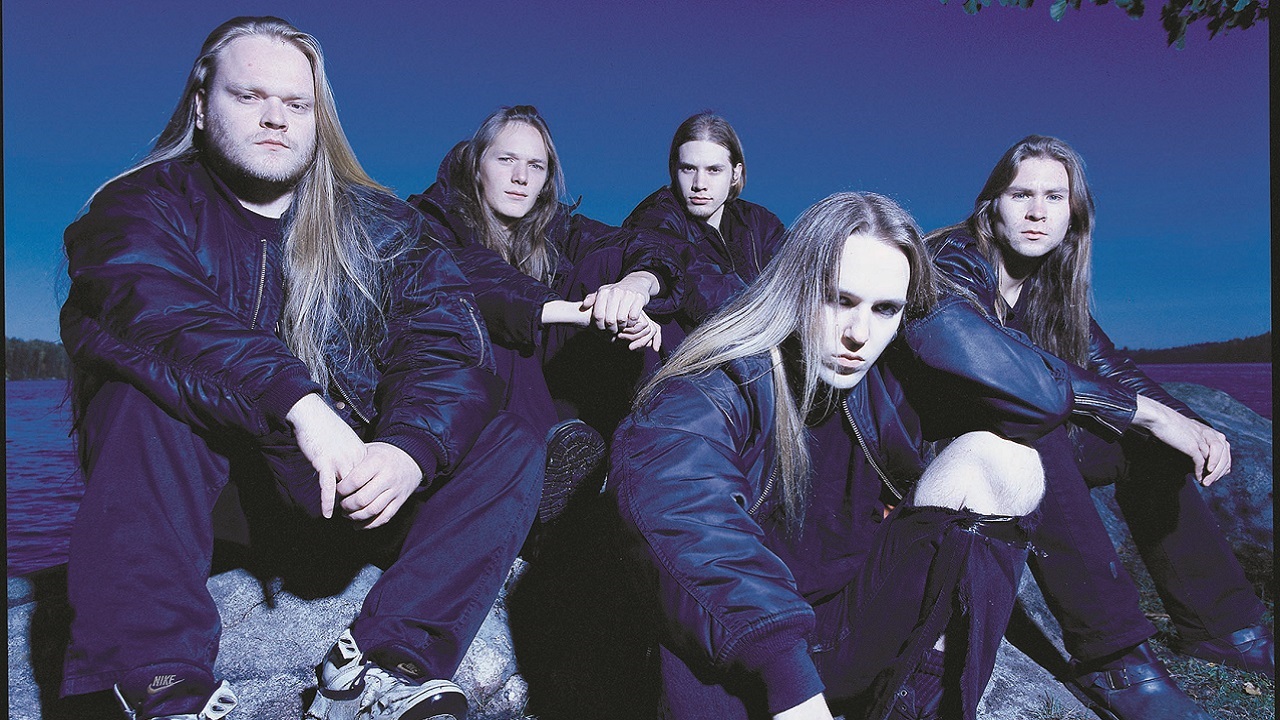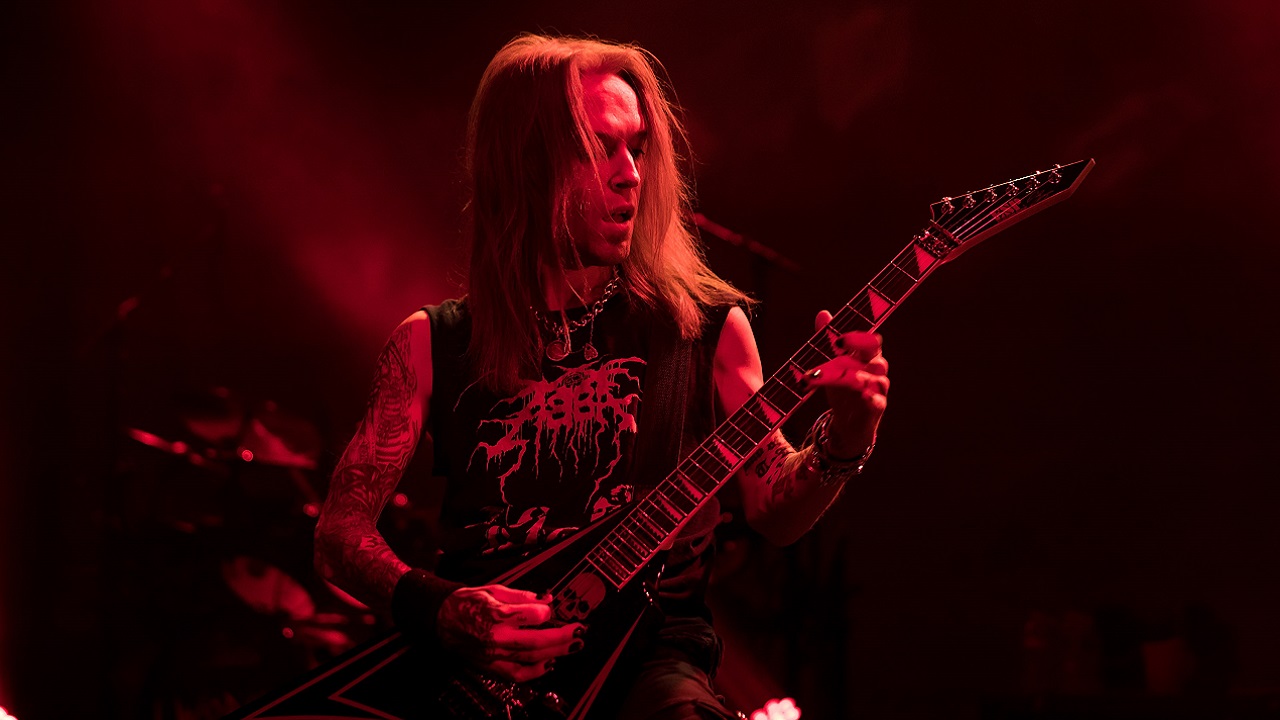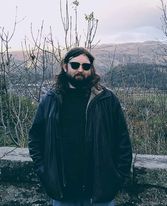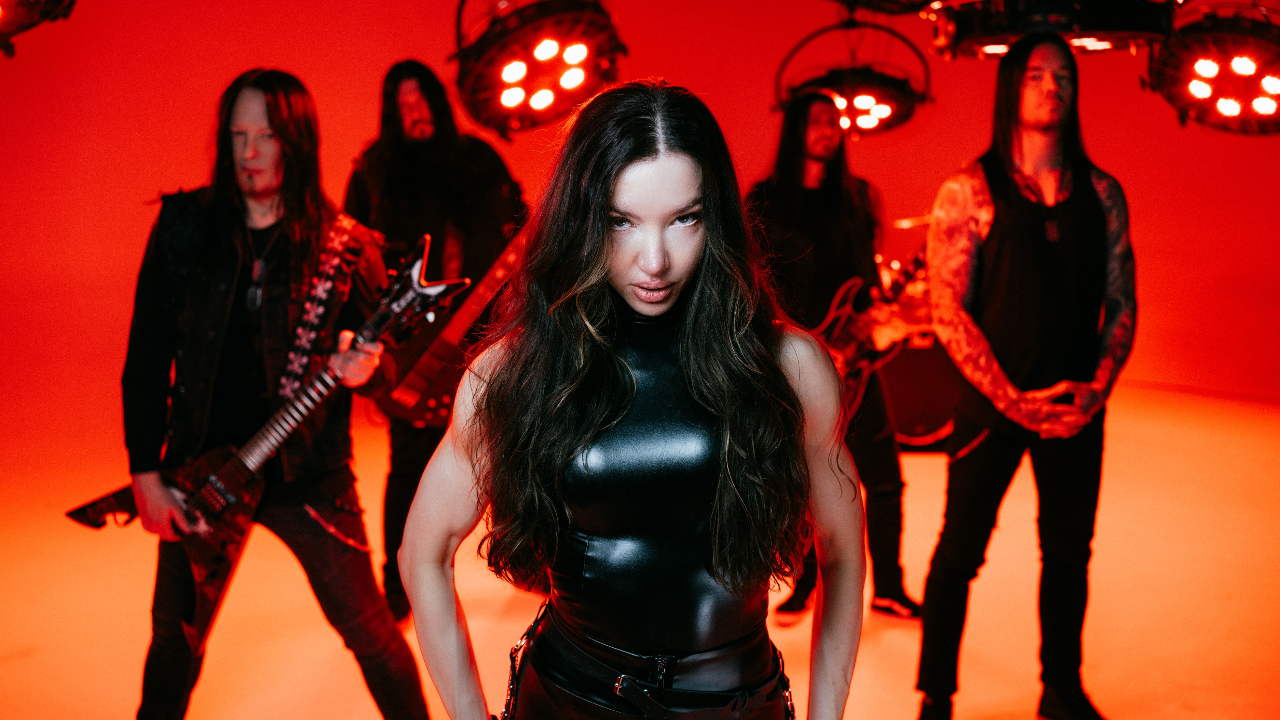"Our tour manager had to have every city’s morgue number, just in case we found Alexi dead in his bunk": The meteoric rise and tragic end of Children Of Bodom
Children Of Bodom helped put Finnish metal on the map in the mid-90s, but substance abuse would ultimately lead to the band's dissolution - and death of iconic guitarist/frontman Alexi Laiho

Select the newsletters you’d like to receive. Then, add your email to sign up.
You are now subscribed
Your newsletter sign-up was successful
Want to add more newsletters?

Every Friday
Louder
Louder’s weekly newsletter is jam-packed with the team’s personal highlights from the last seven days, including features, breaking news, reviews and tons of juicy exclusives from the world of alternative music.

Every Friday
Classic Rock
The Classic Rock newsletter is an essential read for the discerning rock fan. Every week we bring you the news, reviews and the very best features and interviews from our extensive archive. Written by rock fans for rock fans.

Every Friday
Metal Hammer
For the last four decades Metal Hammer has been the world’s greatest metal magazine. Created by metalheads for metalheads, ‘Hammer takes you behind the scenes, closer to the action, and nearer to the bands that you love the most.

Every Friday
Prog
The Prog newsletter brings you the very best of Prog Magazine and our website, every Friday. We'll deliver you the very latest news from the Prog universe, informative features and archive material from Prog’s impressive vault.
On December 15, 2019, Children Of Bodom played their final show. It had been announced six weeks earlier that drummer Jaska Raatikainen, bassist Henkka Seppälä and keyboard player Janne Wirman – who had played on every Bodom album since their 1997 debut, Something Wild –had quit the band to “change direction within their lives”, leaving guitarist Daniel Freyberg and frontman Alexi Laiho to carry on without them.
The show took place at the Helsinki Ice Hall, a short drive from the town of Espoo, where schoolfriends Alexi and Jaska had formed Children Of Bodom 26 years earlier. It was a bittersweet night, but there was a note of tension too. Despite the diplomatic wording of the statement announcing the trio’s departure, the truth was that Alexi’s alcohol and substance abuse problems had driven a wedge between him and his bandmates, prompting the splintering of the band.
“It was a weird, emotional thing,” admits Janne Wirman today. “Right before we went on, I hugged Alexi and I was just struck by the realisation it was the last time I would ever play those songs. With how Alexi was at that point there was no guarantee he wouldn’t choose to fuck it up on purpose either, but he did great. It was emotional, but I was also so relieved because I had gotten so tired of Alexi’s problems.”
Alexi and Daniel carried on working together under the name Bodom After Midnight, but the Helsinki gig would be the last time any of them played as Children Of Bodom. It was the end of the road for a band who had helped put Finnish metal on the global map and who, in their singer and guitarist, featured one of the most talented and charismatic musicians of his generation.
Just over a year later, Alexi was dead, his demons simply too strong for his booze-ravaged body. A recording of that final show has just been released as the live album, A Chapter Called Children Of Bodom. It’s the sound of a band in full flight against all the odds, and a reminder of just how important and influential they – and Alexi Laiho – really were.
No one can quite remember who gave Alexi Laiho the nickname ‘Wildchild’. He may even have given it to himself. But it suited him perfectly. Born in Espoo on April 8, 1979, he was a musical prodigy from an early age. He began learning violin aged seven, but became infatuated with the guitar after his older sister, Anna, introduced him to such larger-than-life bands as Twisted Sister, Guns N’ Roses and W.A.S.P. (the latter’s song Wild Child inspiring that nickname).
Gifted a Tokai Stratocaster when he was 11, Alexi would spend just about every free hour he had practising. He was obsessed with music, but by no means shy. Naturally charismatic, he had both a quick temper and daredevil tendencies that would see him exploring abandoned buildings in his hometown of Espoo, or otherwise skateboarding or skiing while hanging out with local kids. Jaska Raatikainen was a classmate of Alexi’s. The pair spent practically all their time together, sharing everything from first cigarettes to first beers.
Sign up below to get the latest from Metal Hammer, plus exclusive special offers, direct to your inbox!
“He was really into guitarists like Yngwie Malmsteen and Steve Vai, so he got me into those things and really got me into metal,” Jaska says. “Music was something he could communicate with.”
In the early 90s, Finland’s metal scene was small and insular. Bands such as Stratovarius and Sentenced had made ripples elsewhere in Europe, but they were hardly a match for the international superstars Alexi was reading about in the metal magazines he borrowed from his sister. So he did what any cocky 13-year-old would do: he formed his own band, Inearthed, to prove that it could be done.
Alexi persuaded Jaska to join Inearthed as drummer and, inspired the extreme metal scene they were discovering through underground zines and the tape-trading network, they recorded their first demo in the summer of 1994.
“We made like 50 copies and it was a big thing in Espoo,” Jaska recalls. “People started to talk about it because we were kids and all the kids, regardless of what school they were in, would hang around over the weekend.”
One of those kids was Henkka Seppälä, who joined Inearthed on bass in 1995. He’d already heard about Alexi at school. “Alexi was super-charismatic, 13 or 14 years old, wearing a cool leather jacket and cowboy boots, smoking cigarettes,” Henkka recalls. “But he was also hardworking. He would play for six or eight hours a day, and that’s when he was still in school.”
Between Alexi’s natural charisma and the sheer novelty of having a group of kids play primitive death metal, Inearthed packed out gigs at local youth centres, with word spreading further afield. In 1997, when Alexi and Jaska were 18, they decided to record an album.
That was easier said than done. Naively, the band signed a deal with small Belgian label Shiver Records. The only problem was that Inearthed – now completed by rhythm guitarist Alexander Kuoppala and then-session keyboardist Janne Wirman – had to fund the recording themselves. With only enough money to spend a week in the studio, they worked gruelling 16-hour days to get it finished.
The hard work turned out to be worth it when they got a call from Spinefarm Records, a rising Finnish label based in Helsinki. Jaska came up with an ingenious solution to cut ties with Shiver.
“I sent them a fax telling them that the band had split up,” he admits with a sheepish grin. “We changed our name to Children Of Bodom. It was ugly, but we couldn’t just let it happen.”
Their new name was a reference to the Lake Bodom Murders, in which three teenagers were killed on the shores of a lake in Espoo in 1960. The case remained unsolved, though if the band had any qualms about the potential insensitivity of their new name, they either didn’t show it or didn’t care.

The newly christened Children Of Bodom released their debut album, Something Wild, in November 1997. An inventive mixture of melodeath and black metal with an underpinning of 80s bombast, it peaked at an impressive No.3 in the Finnish chart. Strikingly, fellow Finns Nightwish and Him released their debut albums the same month.
“Finnish metal was underground,” Henkka remembers. “Suddenly there were also bands like Nightwish and Him coming out. After that, you could talk about this idea of Finnish metal – before that it didn’t really exist.”
Their second album, 1999’s Hatebreeder, performed even better, topping the Finnish charts. A Japanese tour followed that summer and gave them their first proper foothold outside of Europe, and produced the live album Tokyo Warhearts – Live In Japan 1999.
“The crowds would lose their minds every night,” enthuses Janne, who had been forced to sit out the band’s earlier European tours to finish his final exams. “We were just some 19-year-olds from Finland.”
The band’s next two albums continued their forward march. 2000’s Follow The Reaper saw them adding more power metal elements into the mix, as well as making use of producer Peter Tägtgren’s synthesiser collection. 2003’s Hate Crew Deathroll was their proper international breakthrough, the point where the UK and the US began to take notice of these wild Finns.
“There’s something magical and important about Hate Crew Deathroll,” Janne says. “We’d started touring the States, which opened up a whole new world. Now it felt like we were really a global band.”
That growing international success was rubber-stamped by 2005’s Are You Dead Yet? and an appearance on the North American and European legs of the 2006 Unholy Alliance tour alongside In Flames, Mastodon, Lamb Of God and headliners Slayer. It was a chance for the European band to indulge in some proper transatlantic bonding. “After the shows, Kerry [King] would ask us to hang with him and would force friggin’ Jäger shots on us!” recalls Jaska.
They also enjoyed some unexpected celebrity attention. At one show, they noticed curly-maned soft-jazz saxophone botherer Kenny G watching them from the side of the stage. “It turned out his kids were fans,” says Janne. “He was the nicest guy.”
Another unlikely fan was actor Rob Lowe. The St. Elmo’s Fire star caught Bodom on the Unholy Alliance tour, and namechecked them during an appearance on high-profile US talk show The Tonight Show the following evening. “[Host] Jay Leno asked if there was anyone in the audience who knew who we were,” says Janne, “and someone screamed something, so he was like, ‘Well, that’s one sick person at least. I was just like, fuck yeah! Best promotion we ever had.”
As the band’s reputation grew, so too did Alexi’s status as a figurehead. His unique style was fast establishing him as a guitar icon, while he made no secret of his appetite for alcohol and the wild behaviour that came with it. His tendency towards self-destructive behaviour first became evident in 1998, when he was hospitalised after ingesting tranquillisers and whiskey. But as the 2000s progressed, it escalated until it began impacting on the band’s career. At one point, he broke his arm while drunkenly dancing on top of a car. Shows were cancelled in 2004, 2007 and 2008 after he suffered similar alcohol-fuelled injuries.
“By the end of that touring cycle, Alexi’s first problems with alcoholism started to emerge.” Janne says. “Everyone was partying, but over time there were things he was doing nobody else would… like getting up and taking two shots of vodka first thing.”
His personal issues fed into the band. Creatively, Bodom seemed to have hit a wall. Neither 2008’s Blooddrunk nor its 2011 follow-up, Relentless Reckless Forever, matched the energy and brilliance of the band’s earlier work. The worries about Alexi’s health were such that Jaska admits he even considered calling time on Children Of Bodom right after Relentless.... When the band reconvened after a break, it seemed that Alexi was aware of the problems his lifestyle was causing.
“Alexi got up and said, ‘Sorry guys, I admit I’m an alcoholic – it’s something I carry with me and I promise not to use alcohol while I’m working anymore,’” Henkka explains. “Jaska got up with tears streaming down his face, because things had been bad with them for a long time due to the alcohol. Working on [2013’s] Halo Of Blood was so cathartic for the band, it was like a new start.”
Alexi’s decision to address his alcohol issues meant much of the Halo Of Blood tour cycle was completed sober, and relationships in the band mended. Sadly, it couldn’t last. While the creative form was carried over on 2015’s I Worship Chaos and 2019’s Hexed, Alexi had begun drinking again. Even then, his bandmates figured they could get through the issues.
“My last very good, fond memories of Alexi are working with him on the keyboards for Hexed, because we would always work on those together, just the two of us,” Janne says. “He came to my house and was like, ‘Hey, do you mind if we do these sessions completely sober?’ Obviously I very much did not mind! We had a great time together in that week.”
It proved to be a false dawn. After the release of Hexed was delayed, Alexi departed for Australia to spend time with Kelli Wright-Laiho, a music publicist he had met in 2016 and married in 2017 – controversially, considering he was still legally married to his first wife, Sinergy frontwoman Kimberly Goss. When he returned, his bandmates immediately knew something was wrong.
“He was always a skinny guy, but now he’d lost so much weight he looked like a skeleton,” Janne says. “He’d attempt to play guitars, but he couldn’t play at all. We didn’t know what the fuck to do.”
“We had a kind of intervention at the end of the [Hexed] tour, and Alexi got so mad at us,” Henkka admits. “We told him things couldn’t go on like that. He was in such bad shape that our tour manager had to have every city’s morgue number, just in case we woke up and found him dead in his bunk. 2019 was such a shitshow.”
The band nonetheless managed to complete their touring commitments. Then, in November, came the announcement that Jaska, Henkaa and Janne were leaving. “You always wonder if there’s something you could have done to prevent what happened to Alexi,” says Henkaa. “If I had spoken to him more… whatever. But knowing how stubborn Alexi was, I think he wouldn’t have listened to me anyway and probably just kicked me out.”
There’s certainly no suggestion of ill health or tension in the band on the live recording A Chapter Called Children Of Bodom. Vibrant, electrifying and grandiose, the set covers just about every era of Children Of Bodom and stands as testament to their creative potency, mixing disparate elements together to create an unmistakable sound that has inspired countless subsequent bands.
Although they had initially agreed on ending Children Of Bodom entirely, Alexi surprised them when he revealed plans to continue working with guitarist Daniel Freyberg, who had joined in 2016. Unable to use the Children Of Bodom name legally, Alexi’s new project would ultimately be called Bodom After Midnight, the name of a track on Follow The Reaper.
“It probably wasn’t easy for Alexi,” Henkka admits. “For us it was the last show, but for him he was planning to carry on with a different group. I’m happy he pulled it off as well as he did.”
On January 4, 2021, the news of Alexi Laiho’s death was announced. He had passed away a week earlier, but his family had held back the news. The official cause of death was reported as “alcohol-induced degeneration of the liver and pancreas connective tissue”. He was just 41 years old.
For the surviving members of Children Of Bodom, there is a shared sense of sadness about how things ended. “By that last show, I knew he’d die from his addiction,” Janne says. “He wasn’t interested in getting help and had told me so.”
At the same time, they prefer to remember their friend as he was, and for everything he achieved. “Alexi’s talent was so huge that he inspired people to practise more and more, to reach his level,” Jaska says.
“We knew nothing about anything but we blew up and became an international thing,” agrees Janne. “Our legacy should be that if you believe in what you’re doing and don’t let anyone control you, even with music as weird as Bodom, you can make it.”
A Chapter Called Children Of Bodom is out now via Spinefarm.
Staff writer for Metal Hammer, Rich has never met a feature he didn't fancy, which is just as well when it comes to covering everything rock, punk and metal for both print and online, be it legendary events like Rock In Rio or Clash Of The Titans or seeking out exciting new bands like Nine Treasures, Jinjer and Sleep Token.

